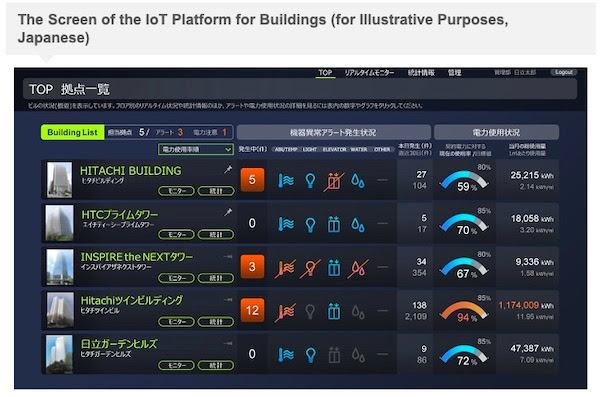Hitachi has developed an IoT platform that brings to buildings the high added value required for the new normal, including high efficiency of building management and improved comfort for building users. Hitachi will launch the IoT platform in 2020 as a new Lumada(1) solution in the field of buildings, in Japan.



Hitachi’s IoT platform for buildings was
developed using Microsoft Azure and Microsoft Dynamics 365, two cloud
platforms of Microsoft Japan Co., Ltd.. Moving forward, Hitachi will
deepen its Collaborative Creation with Microsoft Japan under its newly
commenced
partnership system, the Lumada Alliance Program(2) to develop solutions
in the field of buildings and accelerate the overseas expansion of
these solutions.
In recent years, continuous supplies of large office buildings in urban
areas cause intensification of competition for gaining tenants. In
addition to this, workstyle reform has progressed due to the spread of
COVID-19 infection. These changes surrounding buildings
have accelerated the moves to improve the high added value of buildings
and realize smart buildings by leveraging digital technologies to
achieve the increased efficiency and sophistication of operations in
buildings and to provide greater comfort to office
workers and other building users.
Based on this background, in April 2020 Hitachi and Hitachi Building
Systems Co., Ltd. systematized touchless solutions that enable building
users to move and live without touching in buildings and have been
gradually expanding these lineup(3). Hitachi has
also developed a service platform for developers, which provides office
workers the new experience of working and living using a smartphone
app(4). With these and other moves, Hitachi has continued to enhance its
digital solutions in the field of buildings,
to meet the needs of the new normal.
Hitachi and Microsoft are strengthening their cooperation in many
industrial fields. For example, in June 2020 the companies formed a
strategic alliance related to next-generation digital solutions for
manufacturing and logistics(5). Moreover, Microsoft endorsed
the Lumada Alliance Program, Hitachi’s partnership system newly
commenced on November 4, 2020. This time, in the field of buildings,
Hitachi has developed the IoT platform for buildings as the new Lumada
solution, by utilizing Azure, Dynamics 365, and other
technologies.
The IoT platform for buildings is a solution for developers that enables
comprehensive remote monitoring and analysis of the operating status of
building equipment, including elevators, escalators, and
air-conditioning systems. Intended mainly for large buildings,
it also enables users to simultaneously monitor and analyze multiple
buildings. In addition, it combines and analyzes data about building
equipment and the flow of people, including the crowdedness of each area
of a building. Thus, it improves building management
efficiency and building users’ comfort, and it maintains and improves
the quality of building operations.
“The newly developed IoT platform for buildings is a next-generation
solution for buildings that realize new and efficient operation
managements for building equipment, and comfortable life in the
buildings. I believe this platform contributes significantly
to the customers that progress development of smart buildings and smart
cities utilizing digital technologies,” said Shinya Mitsudomi, Vice
President and Executive Officer, CEO of Building Systems Business Unit,
Hitachi, Ltd., and President of Hitachi Building
Systems Co., Ltd. “Hitachi developed this platform through the
Collaborative Creation with Microsoft Japan. From now on Hitachi will
strengthen Lumada solutions in the field of buildings by proceeding
Collaborative Creation with its partners under the Lumada
Alliance Program and provide new value for ‘people, building systems,
and society.”
“We heartily welcome Hitachi’s provision of its IoT platform for
buildings, which utilizes Microsoft Azure and Microsoft Dynamics 365, to
the Japanese market as part of our strategic alliance,” said Hitoshi
Yoshida, President of Microsoft Japan Co., Ltd. “Microsoft
Azure provides AI and IoT technologies that drive the digital
transformation of customers, and it continues to grow as a global
platform. Hitachi is actively developing smart building solutions for
the new normal. We have high expectations that this platform
will accelerate digital transformation in the building facility
maintenance field. We for our part will also conduct sales promotion
support activities for this solution on Microsoft AppSource. Moving
forward, we will continue to grow our partnership with
Hitachi, including expanding collaboration for overseas markets, and to
work closely with our customers and drive digital transformation that
leads to positive social change.”
Overview of the IoT Platform for Buildings
1. Improving Building Management Efficiency
The platform makes it possible to comprehensively monitor the various
equipment of multiple buildings remotely and visualize the status of use
of the buildings. This enables efficient janitorial and security work
reflecting their status of use and the formulation
of a maintenance plan based on building equipment conditions, thereby
improving the efficiency and quality of building management.
2. Improving Building Users’ Comfort
The platform cooperates with control systems of building equipment, such
as elevators, escalators and air-conditioning systems, based on data on
the flow of people, including the crowdedness of each area of a
building. Thus, it enables building managers to
ease congestion, change temperature settings according to the
crowdedness of each area, and otherwise create comfortable a building
environment. It also provides information about the status of use and
crowdedness of toilets, meeting spaces, and other areas,
supporting building users to achieve workstyles and lifestyles that
meet the needs of the new normal, including ensuring the efficient use
of facilities and social distancing.
3. Maintaining and Improving the Quality of Building Operations
The platform maintains and improves the quality of the operations of
multiple buildings by enabling users to benchmark the number of alerts
activated, energy consumption, and other conditions within each
building, to identify issues faced in operations, and
consider improvement measures.
4. Enabling to Expand Services Easily by Open API(6)
By incorporating standardized open API, the platform easily enables to
add new app by partner companies. Therefore it flexibly expands
services.



